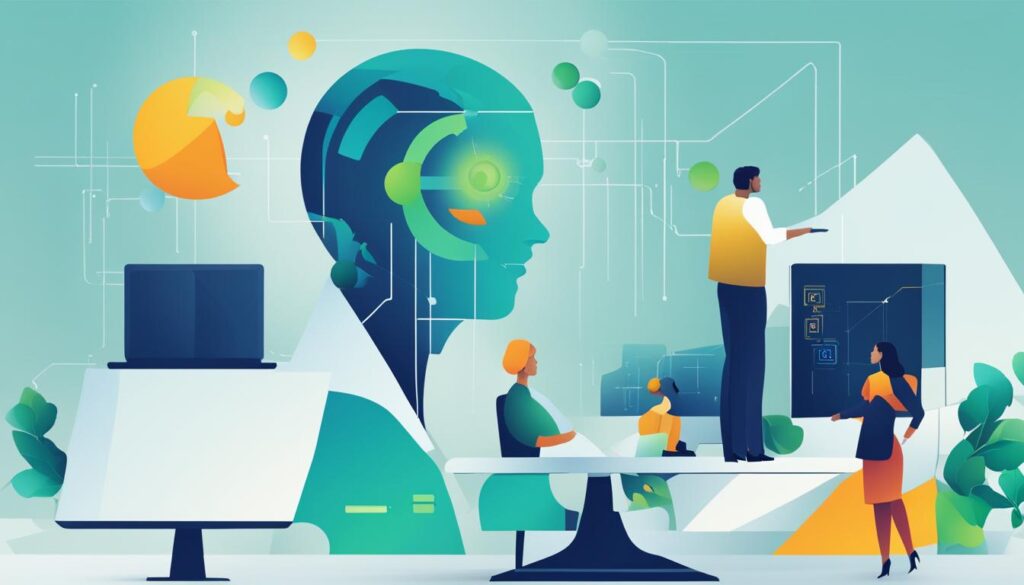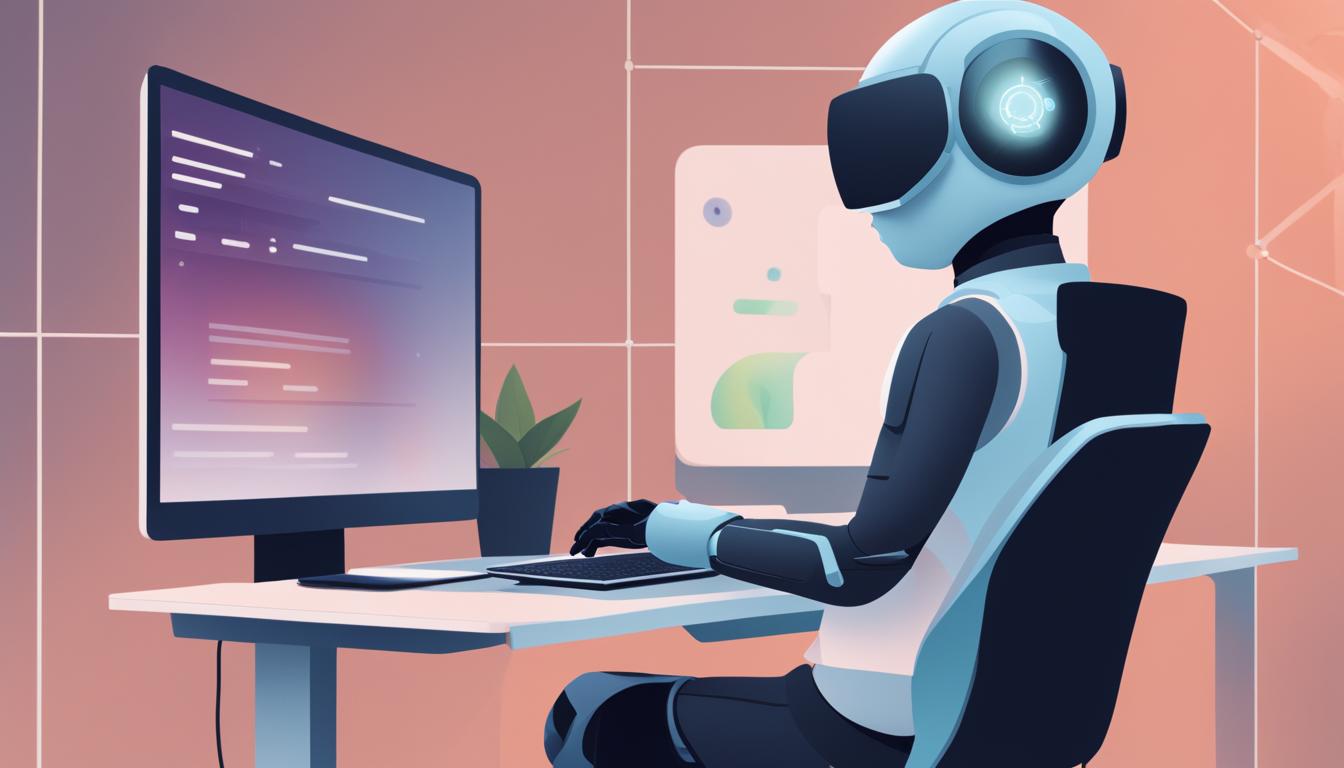Artificial intelligence (AI) is revolutionizing employee training programs, offering benefits such as personalized learning experiences, increased engagement, and more efficient skill enhancement. AI-powered tools and technologies are transforming the way employees learn and develop in the workplace. In this article, we will explore the various trends, applications, and advantages of implementing AI in employee training programs.
Key Takeaways:
- AI in employee training offers personalized learning experiences and increased engagement.
- Implementing AI in training programs enhances skill enhancement and improves efficiency.
- AI-powered tools and technologies transform the way employees learn and develop in the workplace.
- AI-driven employee training programs provide adaptive and immersive learning experiences.
- AI training programs should be accessible and equitable to all employees, regardless of job role or educational background.
The Landscape of AI Training: What is AI and Why is Employee Training Important?
Artificial intelligence (AI) is a groundbreaking technology that enables machines to perform human-like cognitive functions such as perception, reasoning, learning, and problem-solving. Since its inception in the 1950s, AI has undergone significant advancements, resulting in the development of personal calculators, computers, and virtual assistants like Siri and Alexa.
Today, AI continues to evolve rapidly, with generative AI models like ChatGPT gaining popularity. AI has the potential to transform various industries and revolutionize the way we work. This has highlighted the importance of utilizing AI in employee training programs to maximize its benefits and drive organizational growth.
Implementing AI in employee training can bring numerous advantages, including:
- Personalized and adaptive learning experiences: AI algorithms can analyze individual employee data, identify knowledge gaps, and tailor training content according to their specific needs. This customized approach enhances learning outcomes and engagement.
- Improved efficiency: AI-powered training platforms automate administrative tasks, such as content curation and progress tracking, allowing trainers to focus on more strategic aspects of employee development. This streamlines the training process and saves valuable time and resources.
- Enhanced decision-making: AI tools can provide real-time analytics and insights to employees, enabling data-driven decision-making. This empowers employees to make informed choices and improves overall performance and productivity.
By harnessing AI solutions for employee training, organizations can create a skilled workforce that is equipped to meet the challenges of a rapidly evolving digital landscape. The benefits of AI in employee training are undeniable, and businesses that adopt AI-driven training programs gain a competitive edge in today’s fast-paced business environment.
The Impact of AI on the Workforce: Upskilling Strategies and Equity Gaps
Employers need to recognize the transformative potential of implementing AI in employee training and develop effective upskilling strategies to prepare their workforce for the future. However, there is a growing equity gap in AI-driven employee training, with most programs accessible only to white-collar employees. This leaves frontline workers, who make up the majority of the workforce, behind.
To bridge this skills gap and create a more inclusive and empowered workforce, companies must prioritize equitable access to AI training. It is essential to ensure that all employees, regardless of their educational background or job role, have the opportunity to benefit from AI-driven employee training. By doing so, organizations can not only enhance their employees’ skills but also create a more diverse and innovative workforce.

Implementing AI in employee training programs can enable personalized learning experiences, tailored to each employee’s needs and learning style. AI-driven tools can analyze performance data and provide targeted feedback, allowing employees to focus on areas that require improvement. This personalized approach to training can maximize employee engagement and retention, leading to better outcomes and increased productivity.
- AI in employee training can also enhance efficiency by automating certain tasks and processes, freeing up valuable time for employees to focus on more strategic and complex responsibilities.
- Additionally, AI can help companies identify skill gaps and develop customized training plans to address those gaps effectively.
- AI-driven employee training can also support decision-making by providing data-driven insights and recommendations.
To ensure equitable access to AI-driven employee training, organizations should invest in both technological and educational infrastructure. This includes providing access to AI tools and technologies, as well as offering training programs that cater to employees at all skill levels. By empowering employees with AI-driven training opportunities, organizations can foster a culture of learning and continuous improvement.
Real-World Examples of AI in Action: Implications Across Industries
AI technologies are already revolutionizing employee training and driving innovation across a wide range of industries. Let’s take a closer look at some real-world examples:
In Healthcare:
In the healthcare industry, AI-powered systems play a crucial role in data analysis, diagnosis, and treatment planning. By analyzing vast amounts of medical data, AI algorithms can identify patterns and trends that would be difficult for humans to pinpoint. This enables healthcare professionals to make more accurate diagnoses and create personalized treatment plans tailored to each patient’s specific needs. The use of AI technologies in healthcare not only enhances the quality of patient care but also improves efficiency and reduces overall healthcare costs.
In Retail:
Retailers are leveraging AI to provide personalized customer experiences and streamline operations. AI algorithms can analyze customer data, including past purchases, browsing behavior, and preferences, to generate personalized recommendations and offers. This level of personalization enhances customer satisfaction and drives sales. Additionally, AI-powered demand forecasting models help retailers optimize inventory management, ensuring that products are available when and where they are needed. The use of AI in retail not only improves customer engagement but also maximizes profitability.
In Manufacturing and Aviation:
AI-driven virtual reality (VR) and augmented reality (AR) technologies are revolutionizing employee training in industries such as manufacturing and aviation. These immersive technologies simulate real-world scenarios and provide hands-on learning experiences, enabling employees to acquire and practice complex skills in a safe and controlled environment. For example, in manufacturing, AI-powered AR systems can guide employees through assembly processes, reducing errors and improving productivity. Similarly, in aviation, VR simulations can train pilots on emergency procedures and enhance their decision-making skills. AI technologies in these industries enhance training effectiveness and ensure that employees are well-prepared to handle real-world challenges.
These real-world examples illustrate the vast potential of AI technologies in enhancing employee training and driving innovation across various sectors. By embracing AI, organizations can unlock new possibilities, improve operational efficiency, and empower employees to thrive in the digital era.
Overcoming Barriers to AI Learning: An Equitable Framework for AI Skilling
To ensure successful implementation of AI in employee training, organizations need to adopt an equitable framework that caters to the unique learning needs of all employees. By establishing an inclusive and accessible learning environment, companies can unlock the full potential of AI-powered employee training and drive professional development.

The Importance of Equitable Learning Programs
An equitable framework for AI skilling involves providing agile and adaptable learning programs that cater to employees at all levels. This means offering training options that range from basic to expert level, ensuring that each employee has access to relevant and comprehensive AI training materials.
Flexible Learning Options
Alongside comprehensive learning programs, organizations should prioritize offering flexible learning options to accommodate different schedules and learning preferences. Self-paced classes and online modules can enable employees to learn at their own pace, ensuring a customizable and convenient learning experience.
Continuous Learning Culture
By adopting an equitable framework for AI skilling, companies can foster a culture of continuous learning. Encouraging employees to embrace AI-powered training and providing ongoing support can create an environment where professional development is prioritized, allowing individuals to continuously enhance their skills and stay ahead in today’s ever-evolving workplace.
In conclusion, overcoming barriers to AI learning requires organizations to establish an equitable framework that addresses the diverse learning needs of employees. By providing inclusive training programs and flexible learning options, organizations can foster a culture of continuous learning and enable all employees to harness the power of AI in their professional development. Embracing an equitable framework is key to unlocking the full potential of AI-powered employee training and driving long-term success.
The Importance of Trust and Support: Building Employee Confidence in AI
Building trust and confidence among employees is crucial for the successful adoption of AI in employee training programs. Many employees express the need to learn new skills as a result of AI but lack trust in their employers’ support. Employers must invest in building trust through transparent communication, providing access to relevant AI training programs, and demonstrating the benefits of AI in enhancing employee skills and job performance. By fostering a supportive and inclusive environment, organizations can empower employees to embrace AI technologies and leverage them to their full potential.
Implementing AI in employee training programs has numerous benefits. Personalized learning experiences allow employees to acquire new skills based on their individual needs and preferences. AI can also increase engagement by delivering content in an interactive and stimulating manner. Additionally, AI-powered training enables more efficient skill enhancement, saving time and resources compared to traditional methods. Ultimately, building employee confidence in AI empowers organizations to stay competitive and thrive in the digital age.
To establish trust and support, employers should prioritize transparent communication. They should explain the purpose and benefits of AI in employee training, addressing any concerns or misconceptions. Providing access to relevant AI training programs is crucial for employees to upskill and gain confidence in using AI technologies. Employers can also showcase success stories and case studies to demonstrate the positive impact of AI on employee skills and job performance.
The Future of AI in Employee Training: Harnessing the Power of Artificial Neural Networks
The future of employee training lies in the advancement of artificial neural networks. These networks mimic the structure and function of the human brain, enabling machines to process and analyze vast amounts of data quickly. With the power of artificial neural networks, organizations can develop advanced AI tools and technologies to enhance employee training.
One of the key benefits of artificial neural networks is personalized and adaptive learning experiences. By analyzing individual employee data and performance, AI systems can provide tailored training programs that address specific needs and learning styles. This ensures that each employee receives the most relevant and effective training for their professional development.
Another advantage is the ability to simulate real-world scenarios. Through AI-powered simulations, employees can practice their skills and knowledge in a safe and controlled environment. This allows them to gain hands-on experience and develop the necessary expertise required for their roles.
Furthermore, artificial neural networks facilitate continuous skill enhancement. AI systems can track employee progress, identify areas for improvement, and provide ongoing training recommendations. This ensures that skills are constantly updated and aligned with evolving industry demands, enabling employees to stay ahead in rapidly changing markets.
The integration of artificial neural networks in employee training programs also enables organizations to drive innovation. By leveraging AI technologies, companies can discover new insights, uncover hidden patterns, and develop novel approaches to problem-solving. This fosters a culture of innovation and empowers employees to think creatively and embrace new possibilities.
As artificial neural networks continue to evolve and improve, the future of AI in employee training looks promising. By harnessing the power of these networks, organizations can provide personalized, adaptive, and immersive training experiences that enhance employee skills and drive organizational success.
Conclusion
AI has the potential to revolutionize employee training, offering personalized learning experiences, increased engagement, and improved efficiency. By implementing AI-driven training programs and embracing emerging technologies, organizations can unlock the full potential of their workforce and stay competitive in the digital age.
It is essential for employers to prioritize equitable access to AI training, build trust among employees, and provide ongoing support to ensure successful adoption and integration of AI in employee development. By offering equal opportunities for all employees to benefit from AI solutions for employee training, companies can bridge the skills gap and create a more inclusive and empowered workforce.
With the right strategies and frameworks in place, organizations can reap the benefits of AI in employee training and drive long-term success. By leveraging AI’s capabilities, such as personalized learning experiences and improved efficiency, companies can enhance their training programs and empower employees to reach their full potential.
FAQ
What is AI-powered employee training?
AI-powered employee training refers to the use of artificial intelligence technologies and tools to enhance the learning and development of employees in the workplace. It involves the use of AI algorithms and systems to personalize learning experiences, increase engagement, and improve the efficiency of employee training programs.
What are the benefits of implementing AI in employee training?
Implementing AI in employee training offers several benefits, including personalized and adaptive learning experiences, increased engagement and motivation, more efficient skill enhancement, improved decision-making, and the ability to simulate real-world scenarios. AI-powered training programs can help employees acquire new skills, stay ahead in rapidly evolving industries, and drive innovation within their organizations.
How can organizations ensure equitable access to AI training?
To ensure equitable access to AI training, organizations need to prioritize inclusivity and provide training opportunities for employees across all roles and educational backgrounds. This can be achieved by offering flexible and diverse learning programs, including both basic and expert level training, and providing self-paced options to accommodate different learning preferences and schedules. By adopting an equitable framework for AI skilling, organizations can create a more inclusive and empowered workforce.
What are some real-world examples of AI in employee training?
AI is already making a significant impact in various industries. For instance, in manufacturing and aviation, AI-driven virtual reality (VR) and augmented reality (AR) technologies are being used to provide immersive simulations and hands-on learning experiences. In healthcare, AI-powered systems assist in data analysis, diagnosis, and treatment planning. Retailers are leveraging AI to personalize customer experiences and improve demand forecasting. These examples demonstrate the potential of AI technologies in enhancing employee training across different sectors.
How can organizations build trust and confidence in AI among employees?
Building trust and confidence in AI among employees is crucial for successful adoption. Organizations can achieve this by being transparent in their communication about AI initiatives and their impact on employee roles and job security. Providing access to relevant AI training programs and demonstrating the benefits of AI in enhancing employee skills and job performance can also help build trust. Additionally, creating a supportive and inclusive environment where employees feel empowered to embrace AI technologies and contribute their ideas can foster confidence in AI.
What is the future of AI in employee training?
The future of AI in employee training lies in the advancement of artificial neural networks, which mimic the structure and function of the human brain. By harnessing the power of these networks, organizations can develop advanced AI tools and technologies that provide personalized and adaptive learning experiences, simulate real-world scenarios, and facilitate continuous skill enhancement. This will enable employees to stay ahead in rapidly evolving industries and drive innovation within their organizations.




